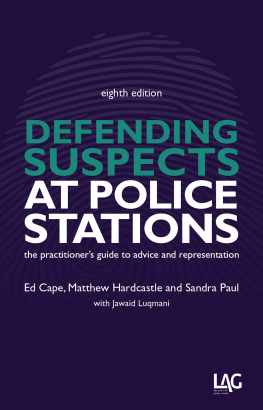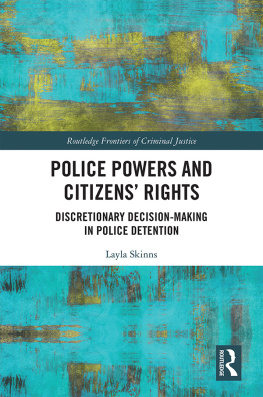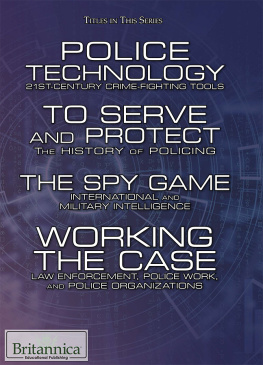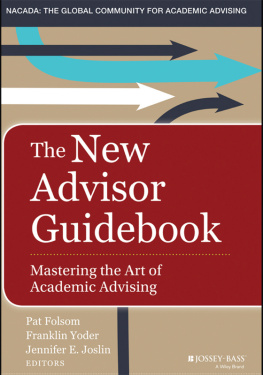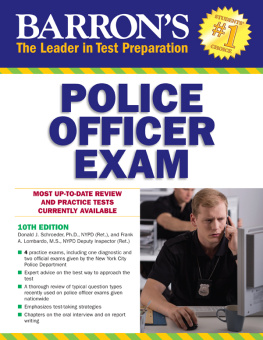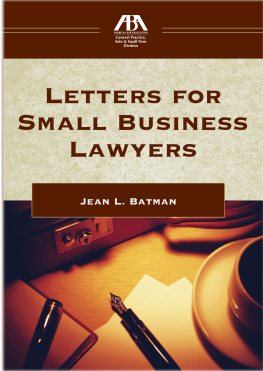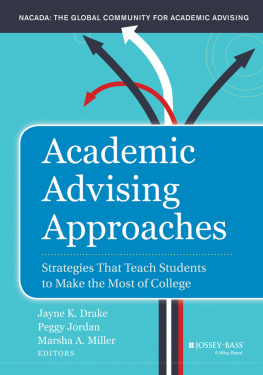
Defending suspects at police stations
the practitioners guide to advice and representation
Ed Cape is a solicitor and Emeritus Professor of Criminal Law and Practice at the University of the West of England, Bristol. Formerly a partner in a legal aid practice in Bristol, and a duty solicitor for 10 years, Ed taught and researched in the area of criminal procedure and criminal justice for most of his academic career. Ed was a contributing author to Blackstones Criminal Practice, and wrote case commentaries for the Criminal Law Review for many years, and is also co-author of the bi-annual Police Station Update in Legal Action. Ed has carried out, and published, research in the field of criminal justice in the UK and internationally, including in Europe, Latin America, China and Japan, and has also worked for the United Nations and international NGOs on early access to legal aid and the right to a lawyer.
Matthew Hardcastle is a solicitor at Kingsley Napley. He is on the editorial board of the Criminal Law Review and acted as a Specialist Adviser for the House of Commons Justice Committees inquiry into the disclosure of evidence in criminal cases. Matt is co-author, with Tony Edwards, of Police Station Advisers Handbook (LAG 2020) and writes, with Ed Cape and Sandra Paul, Police Station Update in Legal Action (LAG). Before joining Kingsley Napley, Matt was a duty solicitor at a large legal aid practice in East London.
Sandra Paul is a partner at Kingsley Napley. She has been an accredited police station representative since 2001. Prior to joining Kingsley Napley she was a duty solicitor and solicitor advocate at a busy legal aid practice in central London. Sandra has a particular interest in representing children and young people. Sandra co-authors the bi-annual Police Station Update in Legal Action.
Jawaid Luqmani is a solicitor specialising in immigration law with Luqmani Thompson & Partners in London. He was an executive member of the Immigration Law Practitioners Association, an assessor for the Law Society immigration panel (19992003) and on the advisory panel of the OISC (Office of the Immigration Services Commission) from 20012005. He was appointed as an assessor to the Law Society Immigration and Asylum Accreditation scheme (and is an Advanced Level Practitioner) and served as Chief Assessor from 20112014. He is a member of the Legal Aid Practitioners Group advisory committee. Jawaid contributes regularly to Legal Action and lectures on courses for immigration lawyers.
The Legal Action Group is a national, independent charity which campaigns for equal access to justice for all members of society. Legal Action Group:
provides support to the practice of lawyers and advisers
inspires developments in that practice
campaigns for improvements in the law and the administration of justice
stimulates debate on how services should be delivered.

Eighth edition published in Great Britain 2020
by LAG Education and Service Trust Limited
c/o Oliver Fisher Solicitors,
Royalty Studios, 105109 Lancaster Road,
London W11 1QF
www.lag.org.uk
Ed Cape, Matthew Hardcastle and Sandra Paul 2020
First-Seventh editions Ed Cape
First published 1993
Second edition 1995
Third edition 1999
Fourth edition 2003
Fifth edition 2006
Sixth edition 2011
Seventh edition 2017
While every effort has been made to ensure that the details in this text are correct, readers must be aware that the law changes and that the accuracy of the material cannot be guaranteed and the author and the publisher accept no responsibility for any losses or damage sustained.
The rights of the authors to be identified as authors of this work have been asserted by them in accordance with the Copyright, Designs and Patents Act 1988.
All rights reserved. No part of this publication may be reproduced, stored in a retrieval system or transmitted in any form or by any means, without permission from the publisher.
British Library Cataloguing in Publication Data
a CIP catalogue record for this book is available from the British Library.
Crown copyright material is produced with the permission of the Controller of HMSO and the Queens Printer for Scotland.
 | This book has been produced using Forest Stewardship Council (FSC) certified paper. The wood used to produce FSC certified products with a Mixed Sources label comes from FSC certified well-managed forests, controlled sources and/or recycled materials. |
Print ISBN: 978 1 912273 95 9
eBook ISBN 978 1 913648 03 9
Bundle (print and eBook) ISBN 978 1 913648 04 6
Typeset by RefineCatch Limited, Bungay, Suffolk
Printed by Hobbs the Printers, Totton, Hampshire
This edition of Defending Suspects at Police Stations is the work of a brand new team of authors. Ed Cape conceived of and wrote the first edition, which was published by the Legal Action Group in 1993. Ed was responsible for all of the subsequent editions, but from the second edition onwards he was joined by Jawaid Luqmani who, ever since, has written the chapter on immigration detainees. For the current edition, Ed has been joined by Matthew Hardcastle and Sandra Paul as co-authors, both highly experienced criminal defence solicitors. We hope you like the end result!
As we write this, our worlds have been turned upside-down by the COVID19 pandemic. This has had a massive impact on the criminal justice system generally, and on the investigative stage of the process in particular. The Police and Criminal Evidence Act 1984 (PACE) and the Codes of Practice were not drafted to take account of such an eventuality. It is difficult, if not impossible, to maintain social distancing in police stations, and this is true for solicitor/client consultations and for police interviews. As a result, a (temporary) interview protocol has been agreed with the aim of enabling, as far as possible, legal advice and assistance to be provided remotely. The dilemma for the authors was whether and how to take account of this, given that we cannot know for how long the temporary arrangements will last, or whether they will have to be reintroduced if there is a renewed public health emergency. For that reason, we have decided not to make substantive alterations to the text to take account of the protocol.
With regard to new material, whilst PACE has remained substantially the same since the previous edition, four of the Codes of Practice have been revised (twice in the case of Codes C and H), and the amended provisions are fully taken into account. The place of safety provisions of the Mental Health Act 1983 have been amended, making it more difficult (in principle) for adults to be taken to a police station as a place of safety, and prohibiting this course of action in the case of juveniles. The police bail without charge provisions, which were newly introduced when the previous edition was published, have resulted in the police making much greater use of release under investigation. A Home Office consultation proposing further revision of the bail provisions is currently under consideration, but the outcome is not yet known. We have taken into account a significant amount of new case-law, ranging from arrest, to appropriate adults, to the right to silence.
Next page
